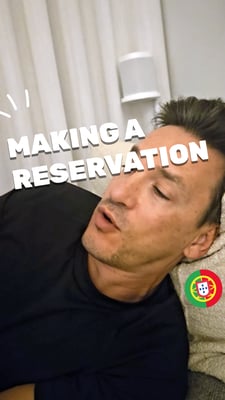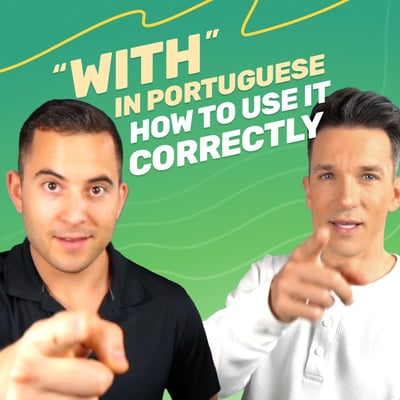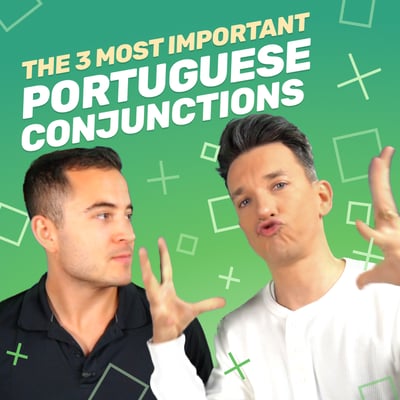Mystery of the Disappearing Sounds (in European Portuguese!)
Have you ever been confused by the way Portuguese natives pronounce their sentences?
Even if you know the individual words, when used together they can sound completely unfamiliar. This is often because some written vowels mysteriously vanish when spoken.
After watching this short introduction video, you can learn more about how to master these concepts here: vowel pronunciation. Not only will you be able to under European Portuguese natives, but you’ll also be able to make your own accent sound much more native!
We've unlocked the Premium Features for this special episode! Members get access to features just like this across our entire library. Learn More
December 19, 2023
May 21, 2023
May 14, 2023
May 7, 2023
April 30, 2023
April 23, 2023
April 16, 2023
April 9, 2023
April 2, 2023
March 28, 2023
 We respect your privacy and have a ZERO TOLERANCE for spam.
We respect your privacy and have a ZERO TOLERANCE for spam.









bri-gad!! amei! 😀 Não sabia completamente da “e” que aparece no fim de alguns verbos ao infinitivo!
Very useful with great animation. Looking forward to the lesson. Well done!
shelent video! A must watch if you’re learning português!
Muito bom, gosto muito.
Entertaining and educational! I know we do this in English too, but it’s so much harder to decipher in a foreign language. Thank you for shedding some light on reductions in such a creative way!
All portuguese misteries are solved 😀 ahahahahahah
Bravo!! I am back and starting over after a year or more away. Very impressed with the changes to the app. I am now carrying my cellphone and earphones to “practice” as often as possible. I’m sticking with this! Parabéns for your hard work!
Excelente video! Vou partilhar com os meus estudantes de português.
fantasticcccc!
O Sherlock veio mesmo a tempo de ajudar os meus pobres alunos com a pronúncia. Obrigado aos 2. Continuarei a divulgar o vosso excelente trabalho. p
Brigad – ta-bom. Talog 🙂
This is great but should I be encouraged or terrified?
I always noticed that, even in Portuguese music but I never stopped to think how that worked. Thanks.
This was the most difficult part of learning Portuguese. My first teachers were from Brazil and when I arrived in Portugal, I came to understand it was a completely different language whose users seemed to be eating half the words.
Great little video and explanation.
Bom trabalho!
Brigadinha
Excelente!
Adorei! Lol
Bon trabalho! Descobri isto quando estave a falar com vizinhos, mas pensei era regional só.
Great job! Thank you! 🙂
Dende o español e o galego estou a estudar o inglés e o portugués. Escribo en galego porque aínda non me atrevo a escribir nos outros dous idiomas. Moitas gracias. Obrigada. Thank you
Ficamos muito felizes por ter recebibo uma mensagem em galego! É interesante ver as diferenças entre espanhol/português/galego. Obrigado Belén! 🙂
I really liked this! It made explicit all those niggling little questions that i have had about the pronunciation of Portuguese words. My question is…does it sound pretentious for a “foreigner” to be using these?
Great question. Rui and I had a conversation about your comment since it was a really interesting point. Some things can sound pretentious coming from us estrangeiros, for example in the case of using too much slang… sounds like we’re trying too hard (and it rarely comes across as natural). But in this case of pronunciation, trying to sound more native, even if that means integrating some of these dropped vowel sounds, can actually help us be better understood by Portuguese speakers, and also sound less robotic. Of course, don’t overdo it, especially with dropping the o’s, since that could sound strange if you eliminate them completely. But overall, our opinion is that you shouldn’t be worried about sounding pretentious when it comes to tuning your pronunciation to the native Portuguese speakers.
That was a jolly helpful answer actually…I’d been wondering abt this too. Oh to sound “local” e nao estrangeira!! Obrigada
This is a good answer – I am visiting Portugal for the third time in a few weeks and THIS time I am determined to speak Portuguese, especially since I will be meeting my son-in-laws’ family for the first time – but I am already getting nervous about opening my mouth!!!!
That’s exciting, meeting the family! Good luck, hope it goes well. I’m sure they will be impressed with your Portuguese-learning efforts. Although cliché, it’s always worth remembering we are usually our worst critics
Hi! As my mother tongue is German, it’s great for me to have combined English and (my favourite language) Portuguese. And as I learned already: when Portuguese people want to be understood, most vowels can be heard 🙂
I’m looking forward to the next lesson. Muito obrigado!
Glad that although English is your second language you still found value (we occasionally get complaints that we use English as a support language but over time we’ve learned it’s the best option for what we do and our demographic!) Thanks for your comment and hope you like the upcoming pronunciation lesson!
It’s not “although” it’s “because” 🙂
Explanations in books for german-speaking Portuguese-learners sometimes don’t really help; comparing English and Portuguese grammar makes it all clear.
Also the vocabulary you use is very helpful!
And: in my holidays in Portugal I always have to switch between these two languages! 🙂
It gets better and better, great work Team PP !
Great video, but scary. Now I have even more the learn!
Haha, scary yes, but hopefully we can know the nature of the beast (so we can be aware of and master these pronunciation challenges!) Hopefully the pronunciation video lesson can help. Thanks for your ongoing premium support, Antone!
Confirms my experience, fab work boys.
The content reveals why I have to ask my Portuguese partner to “please speak clearly” much of the time. I guess I just have to listen differently.
Thank you. I struggle to understand conversational Portuguese for these reasons. This is so helpful.
Jaquelina, thanks for the comment and for the email msg the other day too! Glad we could help and hope the next video about pronunciation (which we’re on track to launch tomorrow) helps too!
Thanks Colleen, we’re on track to launch the lesson tomorrow to try to explore these pronunciation peculiarities in more detail!
Just discovered this extremely useful video Fab stuff!!
Can you point me in the direction of the follow up lesson you mention in the comment to Colleen and Jaquelina – the one you say you were hoping to launch the following day (I’ve had a look in the ‘video’ section but can’t see one dated the following day or two)!
Obrigandinha!!
Thanks for your comment! I think they could be talking about this video & guide: Open & Closed Vowels in European Portuguese
I know the date of that post is September 18, but then the actual video was only uploaded to Youtube on Oct 7 🙂
Or rather, the mysteries have been *revealed*. But hopefully tomorrow when we launch the video lesson, some of them will finally be *solved*!
What a shlent video!!!! For me, natural pronunciation is easily the most difficult part of this very interesting language. I hope you guys do more videos and/or post more tips on this subject. I can’t wait for the next video!
Wonderful help. Thank you. It helps me to understand my Portuguese daughter-in-law much better now. She tries to slow down for me, but I understand now that sometimes her words are really several put together and missing some syllables.
Very helpful
Very useful indeed. Have just returned from Portugal and was able to understand quite a bit, knowing that vowels are often swallowed. Fluent English speakers speak English much the same as they do their native portuguese; at great speed and breathing by osmosis!!
Não vejo a hora para a proxima liçao!
Parabens. Every little helps!
Parabens! This is soooo helpful! I am just starting to learn but this helps a lot! Obrigadissimo!
A very accurate video. I’m waiting for the next lesson! Thanks!
Adorei! Sou estudante idosa dos EUA que nao tem ninquem com quem praticar. Ao ouvir a lingua falada, entendo 1/30 palavras! Agora, percebo porque. Preciso tambem de licoes sobre o infinitivo pessoal: evidente, n’e? Uma licao impressionante!
So, so true. As an American struggling with my verbal Portuguese, this explains my feelings well!
When I arrived in Cascais, long ago, I went out to buy a pack of cigarettes. “Um maço de Português Suaves,faz favor.” Easy for one to say; it took me three weeks. Actually, I think the guy at the news stand was anticipating English, German, or some other language. When we perceive someone to be “other” we have a language anticipation set of expectation. Eventually, our accent improves and I began dressing in local clothes and stopped looking like a tourist. A minha estadia em Portugal durou 5 anos (72-77) com uma revolução incluído.
informative for someone like me just learning, where do I find more please.
Thank You so much for this video. Now it’ s much easier to understand it:)
Very informative and oh so very true!
Xcelent!! very usuful!!brigda!!
Obrigada! I thought I was missing something but this explains it all! 🙂
Muito bem!
Gracias por estos vídeos, estaba perdida con la pronunciación del portugués y ahora lo tengo más claro.
Vocês são sem duvida os melhores profesors do portugese europeo no mundo! Adoro-lhes! Espero que eu va fazer um salto no meu nivel do portugês falado. Tenho o problema que já lei outra pessoa tinha, os portugèses me falam em ingles! sempre tento falar em portugues mas contestam-me em ingles! É muito muito irritante. O ano que vem vou lhes dizer que sou ruso e não me falem em ingles, caralho! PArabens pelo website!
Olá Terry! Muito obrigado pelas palavras simpáticas. Boa sorte com a tua aprendizagem e obrigado pelo apoio 🙂 (Joel)
Great animation and explanation of the disappearing vowels!!
Love it!!
More of the same please?
I’ll add it to the list! 🙂
VERY REASSURING — to know that practically all foreigners learning European Portuguese have this problem, including Brazilians already fluent in the grammar.
Ele = “ill” => OMG yes I thought I was losing my mind.
Weirdly, this word catches me up every time I’m doing the speech-to-text in the lessons. Is there some trick that native speakers use to *imply* the final “e” even though it’s unvoiced? Like emphasizing/prolonging the final consonant (“L”)? Or maybe even a slight breath in place of the final e (sort of like the Spanish do when dropping an “s”)?
OR… do you really just say “ill” and call it a day?
Olá, Paul. We can either articulate the final E with a flick of the tongue, or we just stop at the L and call it a day. The difference between the former and the latter (at least when I do it) is that when the final E is unvoiced, the tip of the tongue either doesn’t declench from the arch behind the upper front teeth (where it went to form the L) or does so silently.
Very helpful! Thank you!
I would love to be able to print these off!
Helpful video, thanks!
The worst for disappearing sounds in most cases are the TV news readers!
And they also speak much too quickly!
I’m sure it’s a conspiracy! 😉
Excellent and fun video.
I need a lot more practice!
Very interesting explanation, but the sound examples in Portuguese are rather exaggerated! The vowels never completely disappear – and they shouldn’t! When they are not audible as such, they should be replaced by a little silence, a minuscule pause.
For example: “estar”, should NOT be pronounced “shtar”, but “_shtar”. “Eu estou” should not sound “iuchtow”, but “iu_ _shtow”.
Composed words, like “trazer-te”, is absolutely NOT “trezert”, but “trezer_t”, and so on.
In the middle of a word, “diferente” should sound “dif_rent” and NOT “difrent”; “consigo”, “consi_g(u)” etc. “Filipe”, is also absolutely NOT “flip”, but “F_lipp”.
In the phrase “o que é que ele disse”, the pauses are mandatory! NOT “ukiékelediss”, but “u_ kié-ke_elediss_”.
And at the end of a word, it’s the same: some vowels, like the “u” should always be there, even faint, the “a” becomes almost a “e” unless it has an accent, and the “e” is in most cases replaced by a silence. Finally, the “o” in most cases becomes a shy “u”, or a longer pause. For instance “passo”, “pass_(u)”.
Unless you want to sound silly…
Portuguese and English are both rhythmic languages. In order to get the emphasis on the right words, certain vowels are dropped.
Spanish is a syllabic language. Importance is placed on enunciating the vowels correctly.
For anybody in Canada, where vowels are dropped with regularity, try saying the following sentence.
For all who went out in a boat, it was a fun time.
In Canada it would sound like this:
Fr ell who wnt outinaboot, twas a fn time.
If you spoke this sentence in Newfoundland, the sentence would not even be understood.
Excellent video. Very informative.
A few months ago, I submitted a question about this topic, I was advised by the PP staff to watch this video. At the time, I didn’t think I was ready to watch the video as I wanted to learn more about pronunciation in general. Eventually, I decided I needed to watch the video because of the huge difference in pronunciations between the “guest” speakers, professional speaker, and slow speaker options in each lesson. This video states, “You’ll learn WHY (italicized) these vowel sounds disappear so you’ll understand European Portuguese…” However, absolutely ZERO explanation is provided about the phantom sounds in the video or in the link (Pronunciation Guide for European Portuguese Vowels). In fact, the video simply states, “Sometimes…” then presents examples implying that in other cases the examples are not valid. Thus, this video (although if does provide useful examples of phantom sounds) lacks any utility except to memorize the examples provided. If the goal is to instruct effectively, please either provide the explanation of “why” or delete the false statement that the video will explain the concept! Your (paying) students will be better served. Thank you.
Thanks for pointing this out – you’re right, the description was a bit too clickbaity and overpromised without delivering. I’ve adjusted the description to clarify that this video is merely an introduction, and linked to a resource about how to learn more about this concept. Thanks for your support and keeping us in check!